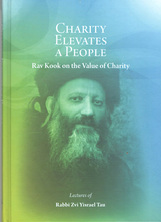from Charity Elevates a People (translator)

The Dignity of the Poor
In contrast to the “firm heart” and distance from charity engendered by a person’s obliviousness to his legal obligation, a faith-based perspective that recognizes the Divine purpose of poverty and how it improves human traits arouses a person’s appreciation for the poor and inspires him to give charity respectfully, joyfully and generously.
True respect for the poor can be found only in the heart of a person who recognizes their vital role and, accordingly, appreciates them. A person who gives charity based on such an approach will do so in a respectful manner, and not disdain the poor who receive their bread from him, just as an employer who pays his workers for their work does not disdain them. But when a person fails to recognize the purpose of poverty, the dignity of the poor is impaired. Rav Kook explains (Ein Ayah: Berachot, Volume 2, Peah #3):
Consequent to the mistaken [and] corrupt view that poverty is characterized by nothing but weakness and neediness, that it is a pointless phenomenon that the world would be better off without, and that a cultured individual’s work should consist only of eliminating poor people from the world in any way possible, a person may arrive at a terribly degraded “firm heart” (as we learned). But even if such a person overcomes that “firmness” so that his compassion for the poor at times murmurs—even if, despite his belief that the phenomenon of poverty must be eradicated, at times he cannot endure the burden suffered by the poor because the feelings in his heart are not completely deadened and his pure human feeling (coming from the nature of his spirit that God made straight) is aroused and his good inclination inspires him to act kindly, nevertheless, he cannot be elevated enough to respect the poor person in his heart, since he continues to view poverty as superfluous neediness. In his compassion, he will throw the pauper a few small coins, but he will not honor him, he will not give him charity with dignity and respect, since he sees him only as a useless burden on society. In his eyes, this poor man burdens the community for no good reason, parasitically draining people’s money without bringing them any benefit. A productive person—a research scientist, a manufacturer, someone in high tech and the like—is worthy of his respect, but there is no reason for him to honor the poor person. However, this is a tremendous error. He cannot understand that poor people create the most significant phenomenon in the world—the education of people and the perfection of their moral physiognomy—and that they are therefore worthy of great honor.
In contrast to the “firm heart” and distance from charity engendered by a person’s obliviousness to his legal obligation, a faith-based perspective that recognizes the Divine purpose of poverty and how it improves human traits arouses a person’s appreciation for the poor and inspires him to give charity respectfully, joyfully and generously.
True respect for the poor can be found only in the heart of a person who recognizes their vital role and, accordingly, appreciates them. A person who gives charity based on such an approach will do so in a respectful manner, and not disdain the poor who receive their bread from him, just as an employer who pays his workers for their work does not disdain them. But when a person fails to recognize the purpose of poverty, the dignity of the poor is impaired. Rav Kook explains (Ein Ayah: Berachot, Volume 2, Peah #3):
Consequent to the mistaken [and] corrupt view that poverty is characterized by nothing but weakness and neediness, that it is a pointless phenomenon that the world would be better off without, and that a cultured individual’s work should consist only of eliminating poor people from the world in any way possible, a person may arrive at a terribly degraded “firm heart” (as we learned). But even if such a person overcomes that “firmness” so that his compassion for the poor at times murmurs—even if, despite his belief that the phenomenon of poverty must be eradicated, at times he cannot endure the burden suffered by the poor because the feelings in his heart are not completely deadened and his pure human feeling (coming from the nature of his spirit that God made straight) is aroused and his good inclination inspires him to act kindly, nevertheless, he cannot be elevated enough to respect the poor person in his heart, since he continues to view poverty as superfluous neediness. In his compassion, he will throw the pauper a few small coins, but he will not honor him, he will not give him charity with dignity and respect, since he sees him only as a useless burden on society. In his eyes, this poor man burdens the community for no good reason, parasitically draining people’s money without bringing them any benefit. A productive person—a research scientist, a manufacturer, someone in high tech and the like—is worthy of his respect, but there is no reason for him to honor the poor person. However, this is a tremendous error. He cannot understand that poor people create the most significant phenomenon in the world—the education of people and the perfection of their moral physiognomy—and that they are therefore worthy of great honor.